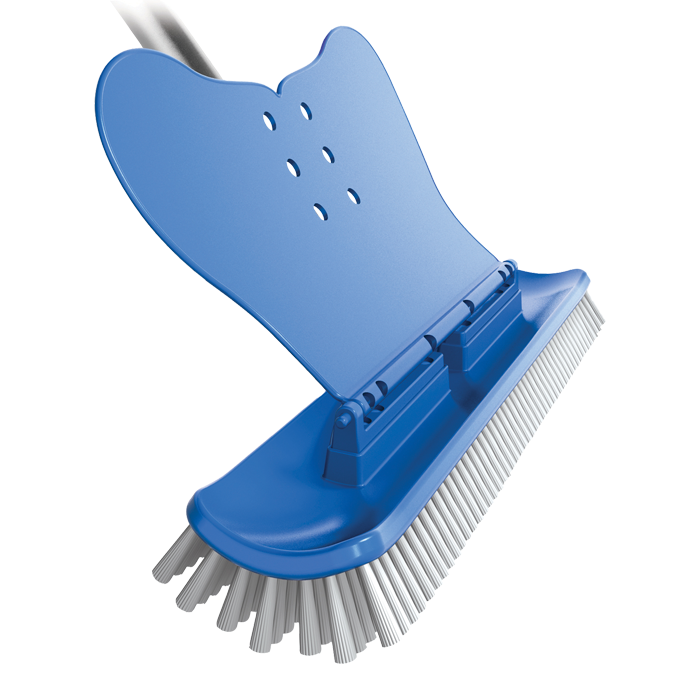WHY, WHEN, AND HOW TO BRUSH YOUR POOL
If the interior finish of your pool is plaster, quartz, or an aggregate finish like Pebble Tec or Wet Edge, knowing why, when, and how to brush your pool is essential. A thorough brushing prevents algae and extends the life of your pool surface, and believe it or not, there is a right way to brush your pool.
WHY BRUSH YOUR POOL
Brush to Prevent Scale: Scale is the white film around the water lines of your swimming pool and is most often the mineral calcium. Brushing will help prevent the build-up of mineral deposits along the waterline.
Brush to Prevent Stains: Different types of stains can occur in your pool. Organic stains usually begin by entering the pool at the surface of the water and are typically a combination of dirt, minerals, and oils. Brushing thoroughly 1-2 times per week will prevent these materials from having the time to create a stain.
Brush to Prevent Algae: Every pool can grow algae, but plaster, quartz, and aggregate finishes are more susceptible. These finishes have small micropores in common, which are the perfect starting point for algae to establish a firm foothold. Consistent brushing will clean these pores out.
Brush to Prevent Etching: A pool that is brushed regularly along with maintaining consistent chemical balance will be softer and smoother.
WHEN TO BRUSH YOUR POOL
Brush After Your Pool Is Plastered/ Replastered, or Pebbled: In this case, your pool needs to be brushed twice a day for 2-3 weeks. This may seem like a lot, but there is a lot of dust that needs to be brushed and filtered, or it can stain and scale the interior surfaces.
Brush after Adding Chemicals: Many powdered or granular pool chemicals don't dissolve right away when added to the pool water. Brushing helps dissolve and disperse the chemicals so that they aren't able to stain, scale, or etch the interior surface.
Brush For Stain or Algae Prevention & Removal: Stains and algae can not be removed by chemicals alone, elbow grease is required. It doesn't matter how much chlorine, shock, algaecide, algae preventive or algae killer you use, the surface must be brushed to break the algae's protective surface and suspend the algae in the water so that the chemicals can do their job.
HOW TO BRUSH YOUR POOL
Brush Your Pool From the Same Point Every Time: By starting in the same spot every time, and not jumping around, you'll be sure to cover every inch. You can't always see the beginning of algae growth, so if you start in the same spot, you won't miss anything. This is critical for algae prevention. Use the short pole for steps and shallow end walls, extend the pole for floor work.
Brush Your Pool Starting at the Steps: Most pool vacuums will not ever touch your steps, and if your vacuum does, it will still need your help because this area is more vulnerable to algae and staining. Start with the top step and make sure that you are pushing the brush NOT pulling. Align your brush so that you are always pushing toward the center of the pool. Here, your vacuum will be sure to pick up everything. Don't forget the face of the steps, which may require you to use your brush sideways.
Work Your Way Around the Edge in One Direction: Start your brush right at the water line and push the brush straight DOWN to the bottom curve of the pool, with one fluid stroke.
Ladders, Ledges, & Steps: When you come to a ladder, ledge, or steps in the deep end, make sure to get the inside edges.
Skimmer Ports: Skimmer Ports can be a little tricky, but again, if you turn your brush sideways, you can get the corners and sides. Quick Tip - By removing the brush from the pole, you can lean over, and on your knees (a towel under the knees helps), brush by hand.
OUR TOP RECOMMENDED POOL BRUSH:
The Wall Whale: This brush helps you work smarter, not harder. The Wall Whale Swimming Pool Brush is a pool brush with a spoiler. The spoiler, or tail, holds the brush against the pool surface with more than 10x the force of a regular brush. As long as the Wall Whale is moving, it will grip the walls (or bottom) of the pool; long fluid strokes maximize your efforts. Quick Tip: Take care of your pool brush! Make sure to store your brush out of the elements. The sun, weather, and extreme temperatures will wither the bristles.
Are you local? We stock these in our Germantown store!
Yes, we have a post on how to brush your pool. It may seem simple enough and although it is one of the easiest parts of pool maintenance, it is one of the most important. A thorough weekly brushing will prevent algae, extend the life of your pools interior surface, and reduce your need for expensive chemicals.
/HAPPY SWIMMING/


